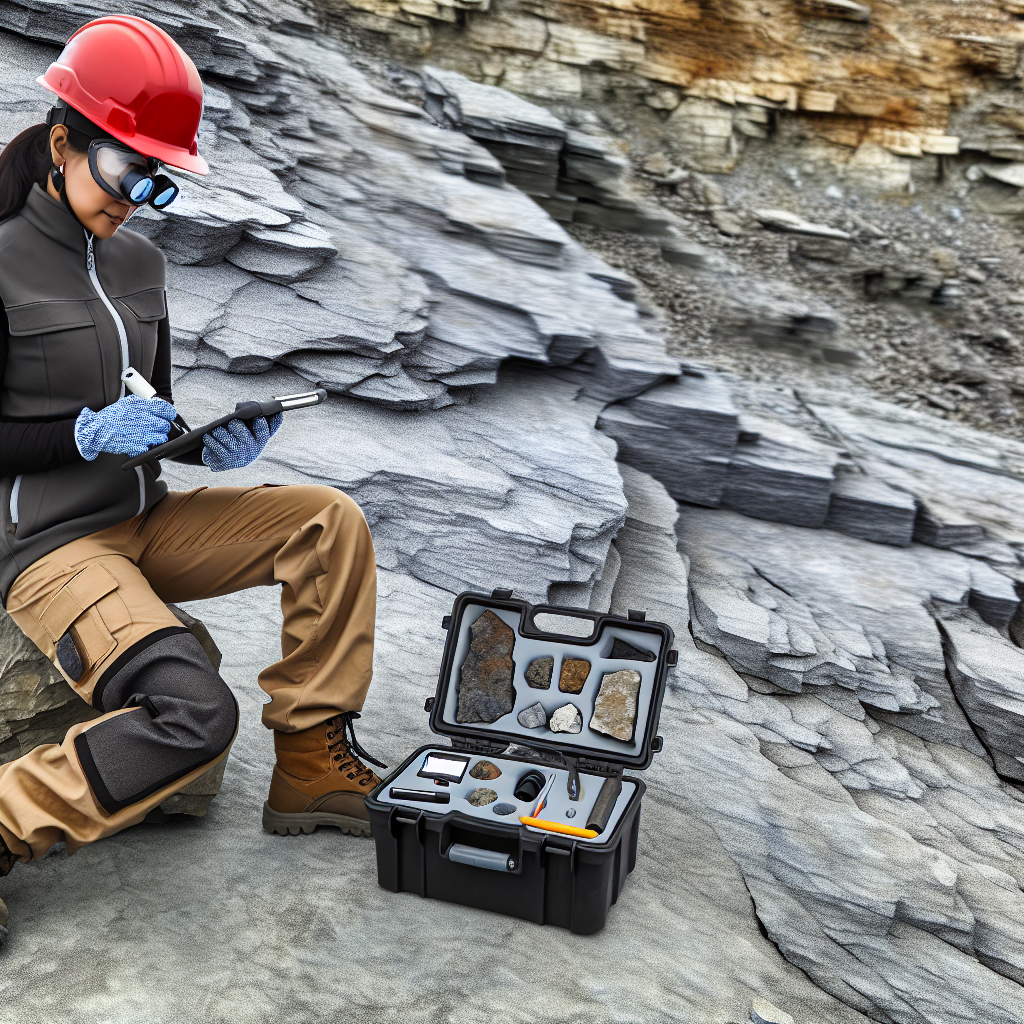Overview of Geology Careers in Canada
Current Landscape of Geology Careers
The geology job market in Canada offers diverse opportunities.
As the demand for natural resources grows, so does the need for geologists.
Geologists play key roles in mining, oil, gas, and environmental sectors.
For instance, companies like Silver Standard Resources seek geologists for exploration projects.
Moreover, the rise of renewable energy enhances geoscience demand.
Many organizations focus on sustainable practices, creating more geology roles.
Opportunities and Specializations
Geology careers in Canada span various specializations.
Exploration geologists assess sites for mineral extraction or energy resources.
Environmental geologists focus on minimizing impacts of industrial activities.
Moreover, hydrogeologists study water resources and their sustainable management.
The growing interest in environmental conservation drives demand for these specialists.
Education and Training Requirements
A solid educational background is critical for aspiring geologists.
Most entry-level positions require at least a bachelor’s degree in geology or related fields.
Advanced roles often necessitate a master’s or doctoral degree.
Internships and fieldwork experience enhance employability significantly.
Professional credentials, such as P.Geo designation, can boost career prospects.
Technological Advancements and Trends
Technology is reshaping geology careers in Canada.
Geologists increasingly use software for data analysis and modeling.
Moreover, remote sensing and GIS technologies are becoming standard practice.
These tools assist in efficient resource exploration and management.
As a result, tech-savvy geologists are highly sought after in the job market.
Challenges and Considerations
While opportunities exist, challenges are also present in the geology field.
The competitive job market requires continuous skill enhancement.
Geologists must adapt to changing environmental regulations and technologies.
Additionally, public concerns about resource extraction can impact job availability.
Unlock Your Career Potential
Visualize a clear path to success with our tailored Career Consulting service. Personalized insights in just 1-3 days.
Get StartedNetworking and professional development are crucial for sustained success.
Impact of Climate Change on Geological Studies and Careers
Shifting Research Focus
Climate change alters geological research priorities significantly.
Researchers now investigate how changing climates affect Earth’s processes.
This shift leads to a greater emphasis on environmental geology.
Emerging Career Opportunities
The demand for geo-scientists continues to rise.
Many companies seek experts in climate resilience and disaster prevention.
New roles develop in renewable energy and resource management.
Technological Advancements
Climate change drives innovation in geological tools and methods.
Data collection techniques evolve to meet new challenges.
Remote sensing technology plays a vital role in research today.
Importance of Interdisciplinary Collaboration
Geologists increasingly work with climate scientists and economists.
This collaboration leads to more comprehensive solutions for climate issues.
For example, integrated teams address water resource management issues.
Emphasis on Public Awareness and Education
Geological careers now incorporate a focus on public communication.
Educating the public about climate impacts is essential.
Professionals may engage in community outreach and workshops.
Future Skill Requirements
Geologists need new skill sets to adapt to changing demands.
Analytical and technical skills will become increasingly important.
Training programs must evolve to include these competencies.
Global Perspectives on Local Issues
Climate change is a global challenge with local consequences.
Geologists will address specific impacts in their regions.
Understanding global trends enhances local knowledge and solutions.
Emerging Technologies in Geology and Their Implications for the Workforce
Advancements in Remote Sensing
Remote sensing technology has revolutionized geological fieldwork.
Professionals use satellites to gather data about the Earth’s surface.
This method enhances accuracy and reduces time spent in the field.
Furthermore, it allows geologists to monitor changes over large areas.
As such, workers must adapt to analyze complex datasets efficiently.
3D Geological Modeling
3D modeling provides a visual representation of geological structures.
This technology aids in understanding subsurface formations.
Moreover, it improves communication among stakeholders.
Geologists can share findings with engineers and environmentalists effectively.
Consequently, professionals need skills in software used for 3D modeling.
Artificial Intelligence and Machine Learning
AI and machine learning are reshaping data analysis in geology.
These technologies assist in predicting geological phenomena.
For example, algorithms can identify mineral deposits with high accuracy.
Consequently, professionals must develop technical skills in these areas.
Staying updated on AI advances will enhance their marketability.
Environmental Monitoring Technologies
Technological innovations enable better environmental monitoring.
Geologists utilize sensors to track changes in ecosystems and geology.
Such technologies help in assessing the impacts of climate change.
Additionally, they offer real-time data crucial for decision-making.
Thus, professionals must be proficient in using these monitoring tools.
Implications for Education and Training
The rise of these technologies necessitates revised educational standards.
Institutions must include training in advanced technological tools.
Moreover, internships must focus on practical applications of new technologies.
Continuing education programs will help professionals stay competitive.
As a result, adapting to technological changes is essential for career growth.
Gain More Insights: Advanced Geology Certifications to Boost Your Career
Role of Geology in Natural Resource Management and Sustainability
Understanding Natural Resource Management
Natural resource management focuses on sustainable practices.
It aims to balance human needs with environmental health.
Geology plays a crucial role in this balance.
It studies the Earth’s materials and processes.
This study helps ensure resources are used wisely.
Geology’s Impact on Sustainability
Geologists assess resource availability and potential impacts.
They analyze land use and environmental changes.
This analysis informs sustainable practices across industries.
For instance, mining operations rely on geological surveys.
These surveys determine safe extraction methods.
Applications in Energy Production
Geology is vital in the energy sector.
It helps locate fossil fuels and renewable energy sources.
Geologists evaluate underground formations for storing energy.
Additionally, they assess the feasibility of geothermal energy.
Environmental Protection and Conservation
Geologists contribute to environmental conservation efforts.
They study soil, water, and ecosystem interactions.
Understanding these interactions aids in protecting biodiversity.
Effective land management practices stem from geological insights.
The Role of Technology in Geology
Modern technology enhances geological research.
Tech innovations improve resource mapping and monitoring.
Tools like GIS and remote sensing provide valuable data.
These technologies enable better decision-making in resource management.
Career Opportunities in Sustainable Resource Management
As sustainability gains importance, geology careers expand.
Various sectors seek skilled geologists for sustainable practices.
Mining companies prioritize environmental compliance roles.
Energy firms require expertise in renewable resource evaluation.
Additionally, government agencies need geologists for regulatory oversight.
Uncover the Details: Academic Pathways To Becoming A Physicist In Canada
Educational Pathways and Training Required for Future Geologists in Canada
Overview of Geology Education
A solid educational foundation is vital for aspiring geologists.
Most geologists hold a bachelor’s degree in geology or a related field.
Many universities across Canada offer specialized programs in geology.
For instance, the University of Calgary provides comprehensive geology courses.
Additionally, pursuing a master’s degree can enhance career prospects.
Essential Skills and Knowledge Areas
Future geologists must develop a diverse skill set.
Strong analytical skills are crucial for interpreting geological data.
Proficiency in geological mapping techniques is also important.
Further knowledge in environmental science is increasingly valuable.
Moreover, understanding geophysics can benefit geologists working in resource exploration.
Practical Experience and Internships
Gaining practical experience is equally important as academic qualifications.
Internships provide invaluable hands-on experience in the field.
Students should seek summer internships with mining companies or research institutions.
Such experiences allow them to apply academic knowledge in real-world situations.
Networking during internships can open doors to future job opportunities.
Professional Certification and Licensure
Obtaining professional certification can elevate a geologist’s career.
In Canada, certification often enhances credibility and job prospects.
The Canadian Council of Professional Geoscientists oversees this certification.
Candidates must pass a comprehensive exam and meet educational requirements.
Once certified, geologists are recognized as qualified professionals.
Continuing Education and Specialization
Ongoing learning is essential in the ever-evolving field of geology.
Specialization can set geologists apart in a competitive job market.
Advanced courses in areas like hydrogeology or mineralogy are beneficial.
Attending workshops and conferences also helps professionals stay updated.
Furthermore, online courses provide flexible learning opportunities for busy professionals.
Learn More: Top Skills Needed To Succeed As A Physicist

Collaboration Between Industry, Government, and Academic Institutions in Geology
Importance of Collaboration
Collaboration in geology enriches both education and industry practices.
It fosters innovation by combining diverse expertise.
Moreover, collaborative efforts can address global challenges.
Roles of Stakeholders
Educational institutions equip students with necessary skills.
They also conduct research that informs industry practices.
Industry players help shape curricula to ensure relevance.
Government agencies provide funding and policy support.
They create regulations that promote sustainable practices.
Partnership Models
Partnerships can take various forms in geology.
- Internship programs connect students with industry experience.
- Joint research projects leverage resources from both sectors.
- Workshops and seminars enhance knowledge sharing.
Case Studies of Successful Collaborations
Several Canadian universities are leading successful partnerships.
For instance, the University of Alberta collaborates with local mining companies.
This alliance facilitates research that benefits both parties.
The British Columbia Institute of Technology partners with government agencies.
Such efforts improve community engagement in geological initiatives.
Challenges in Collaboration
Despite its benefits, collaboration comes with challenges.
Different priorities among stakeholders can lead to conflicts.
Additionally, funding limitations may restrict project scopes.
Effective communication is crucial for overcoming these hurdles.
Future Directions
Future collaborations will likely focus on sustainable practices.
They will also prioritize technology advancements in geology.
Furthermore, global challenges will drive more partnerships.
Ultimately, cooperation can shape the future of geology careers.
Discover More: Exploring Job Roles and Responsibilities of Ecologists
Geological Hazards Management and Its Influence on Job Opportunities
Overview of Geological Hazards
Geological hazards pose significant threats to communities across Canada.
These include earthquakes, landslides, and volcanic eruptions.
Climate change exacerbates the frequency and intensity of these hazards.
Professionals in geology play a critical role in managing these risks.
Importance of Geological Hazards Management
Effective geological hazards management saves lives and protects property.
Communities rely on geologists to assess vulnerabilities and provide solutions.
This field requires expertise in natural processes and risk analysis.
As such, it opens diverse career opportunities across sectors.
Emerging Job Opportunities
The increasing focus on environmental sustainability influences job markets.
There is a rising demand for specialists in hazard assessment.
- Risk analysts assess geological hazards and develop mitigation plans.
- Field geologists conduct onsite investigations of potential hazards.
- Consultants help municipalities adapt to changing geological landscapes.
Government and Institutional Support
Government agencies prioritize geological hazards management initiatives.
Programs promote research and innovation in this crucial area.
Partnerships between governments and universities enhance job prospects.
Students can gain experience through internships and research projects.
Technological Advancements and Their Impact
Technological advancements reshape the landscape of geological hazards management.
Remote sensing and GIS tools improve hazard monitoring capabilities.
Data analytics enhance the accuracy of risk assessments.
Professionals skilled in these technologies are increasingly sought after.
Future Outlook for Geology Careers in Canada
The job market for geologists is expected to grow over the next decade.
As climate-related issues persist, so will the need for expert guidance.
Moreover, ongoing training and education will remain vital.
Ultimately, geology careers will focus on sustainable practices and innovation.
Trends in Remote Work and Its Effect on Geology Professionals in Canada
Adoption of Remote Work
Remote work has become increasingly common in many industries.
Geology is no exception to this trend.
Many geology professionals now conduct research and analysis from home.
This shift allows for greater flexibility in their work schedules.
As a result, professionals can balance personal and work commitments more effectively.
Technological Advancements
Advancements in technology have made remote work feasible.
Geoscientists can now access sophisticated tools online.
Data analysis software and virtual collaboration tools enhance productivity.
For instance, platforms like Zoom and Microsoft Teams facilitate communication.
Impact on Employment Opportunities
Remote work opens doors to global job opportunities.
Geology professionals can apply for positions outside of Canada.
This trend broadens the geographical scope of their work.
Local companies are also adapting by hiring remote employees.
Additionally, remote work allows companies to tap into a diverse talent pool.
Challenges Faced by Geology Professionals
Despite its benefits, remote work presents challenges.
Collaboration can become difficult in a virtual environment.
Some geologists miss hands-on fieldwork experiences.
Moreover, communication gaps may arise among team members.
Additionally, maintaining work-life balance can be challenging.
Future of Geology Careers
The future looks promising for geology professionals in Canada.
Companies are increasingly seeing the benefits of remote work.
This shift may lead to more flexible work arrangements.
In turn, it can attract new talent to the industry.
As remote work becomes the norm, geologists will adapt accordingly.
Additional Resources
Western planetary geologist to lead science for Canada’s lunar rover …




